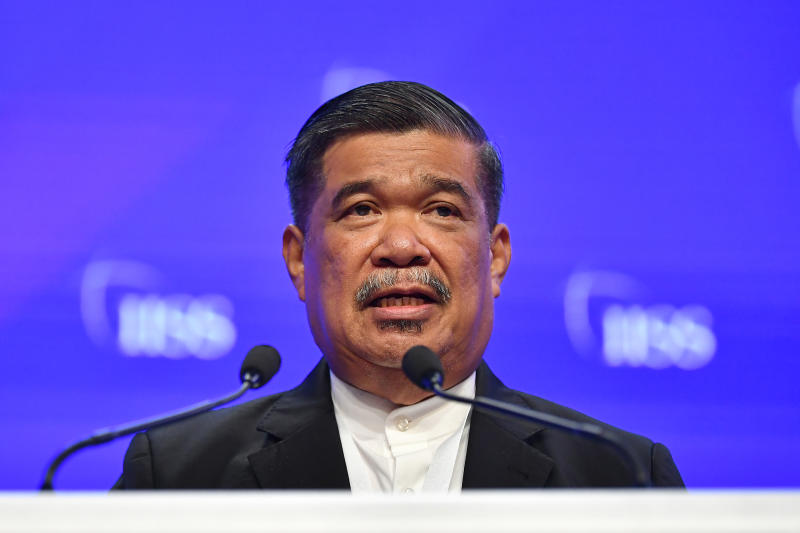South China Sea dispute, Rohingya crisis are key regional threats: Malaysian defence minister
Sign up now: Get ST's newsletters delivered to your inbox

Malaysia's Defence Minister Mohamad Sabu speaking at the Shangri-La Dialogue on June 1, 2019.
ST PHOTO: LIM YAOHUI
Follow topic:
SINGAPORE - Disturbances in the South China Sea, the movement of Rohingyas in the region and non-traditional security threats such as maritime and cyber security risks pose the biggest challenges to the region, Malaysia's Defence Minister Mohamad Sabu said on Saturday (June 1).
The region needs to build on collaborative defence diplomacy to deal with these challenges, Mr Mohamad said in his address to the Shangri-La Dialogue.
The geopolitical situation has changed much in recent years, together with military power and the economic potential of countries. At the same time, Asia is growing. All this means that the region is the world's fastest growing one and its military expenditure is growing fast too, the Malaysian minister said during a plenary session titled Asia's Evolving Security Order and Its Challenges.
Stability in the Strait of Malacca is particularly important, with more than 100,000 ships passing through the regional waters, he noted, adding that the South China Sea is vital too.
It is important that nations do not have war and the 1982 United Nations Convention on the Law of the Sea (Unclos) is upheld, he said, referring to the universally accepted set of rules governing naval operations in the oceans.
"If anything happens in the Strait of Hormuz, the world will suffer. Similarly, if anything happens in South China Sea, the world will suffer. So we have to increase defence diplomacy," Mr Mohamad said.
China claims sovereignty over most of the South China Sea, but parts of the waters are disputed by several Asean countries - the Philippines, Vietnam, Malaysia and Brunei - as well as Taiwan.
The United States has conducted freedom of navigation operations in the disputed waterways, and both China and the US have spoken out against each other's actions in recent years.
"We love America. But we also love China," the defence minister said, emphasising the need for stability. "It should remain an area of peace, friendship and trade, rather than one of confrontation and conflict."
He also highlighted the large movement of Rohingya refugees as another regional challenge.
"The plight of Rohingyas has snowballed into a crisis. No longer is the situation in (Myanmar's) Rakhine a domestic conflict.
"Malaysia will continue to subscribe to the Asean principle of non-interference. But the widespread movement of Rohingyas creates instability," he said, adding that it could be a factor in extremism.
Hundreds of thousands of Rohingyas have fled Myanmar in recent years, many of them heading to Bangladesh where they have been living in temporary camps, while they await a decision on their future, and repatriation back to Myanmar. Some, however, have made their way to neighbouring countries such as Malaysia and Thailand.
But reports that have hinted at their involvement with terrorism have raised alarm bells.

Last month, Malaysia arrested four men who were said to be planning attacks on temples and churches to avenge the death of a Malay-Muslim fireman, who died from injuries sustained after he responded to an emergency call at a Hindu temple, where a riot had taken place last November.
There were people who felt that the government had not suitably addressed his death.
Of the four people arrested, two were ethnic Rohingyas.

